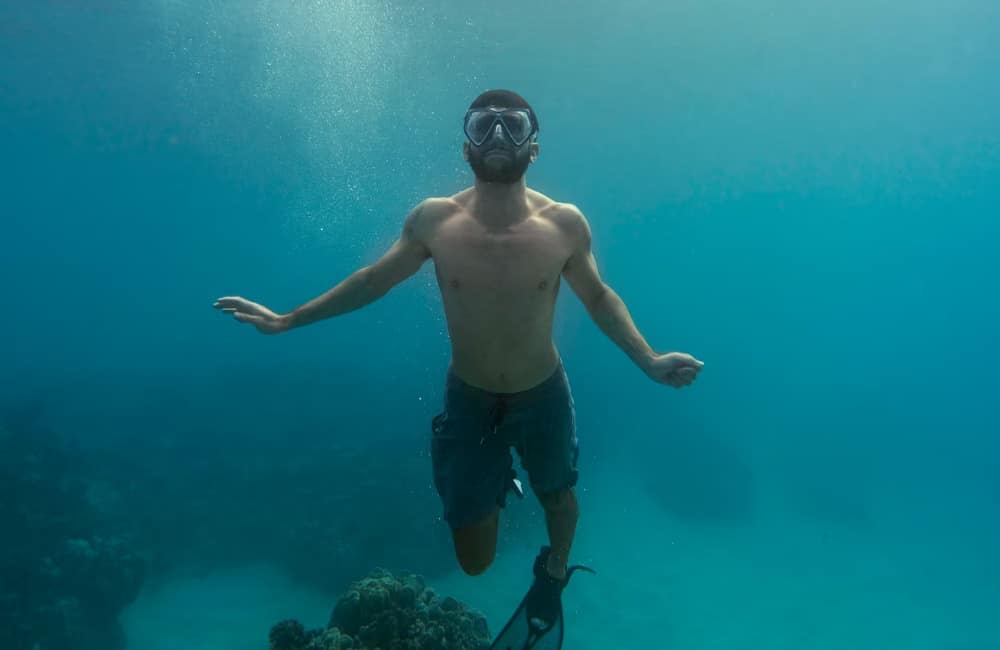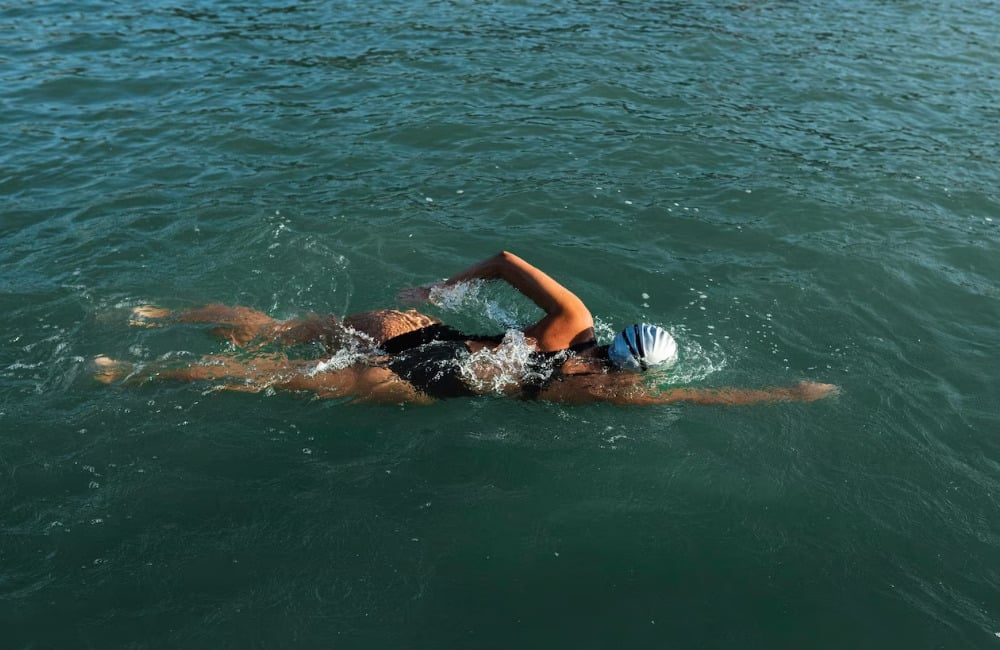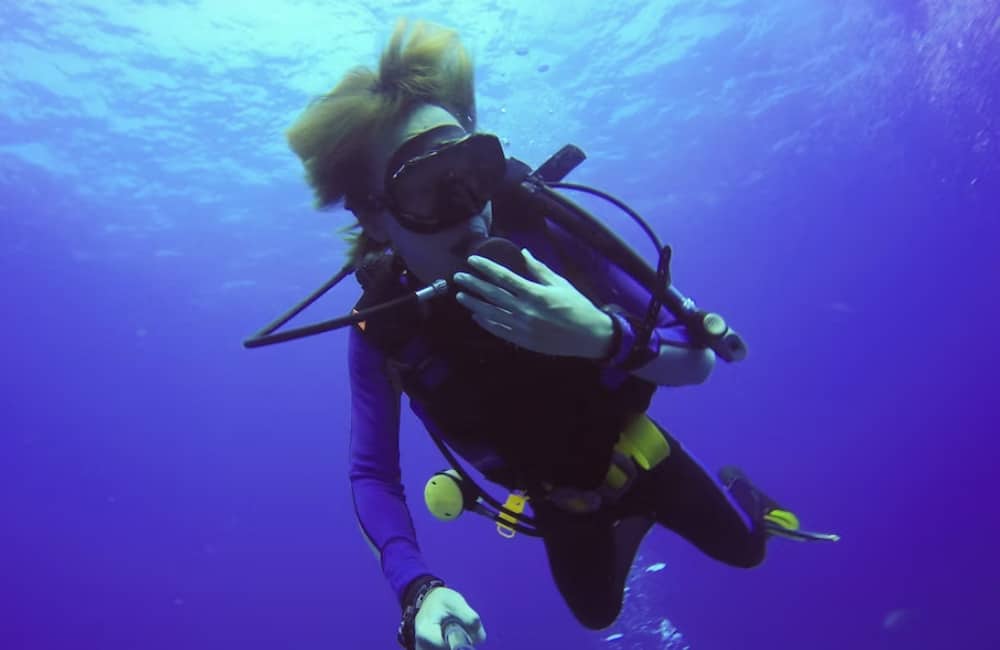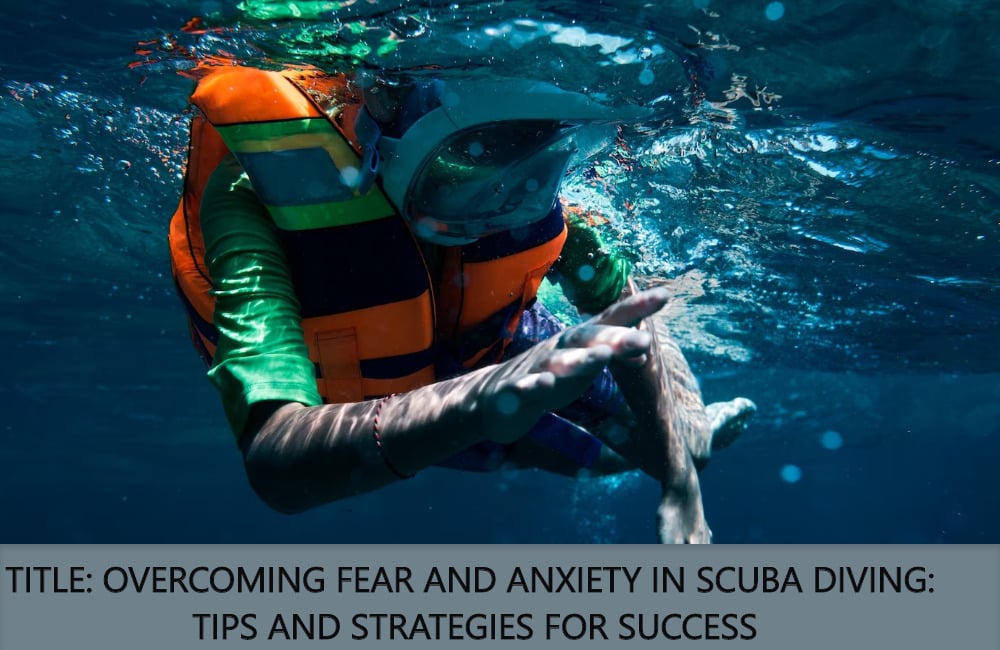Let’s face it, fear and anxiety can be a sign when trying something new – such as participating in scuba diving. But the good news is that with some patience, dedication, and practice, you don’t have to let fear stop you from achieving your goals underwater.
In this blog post, we’ll look at strategies for helping pre-dive jitters, which should improve your confidence and keep anxiety levels in check so you’re better prepared for any unforeseen challenges that may arise during dives.
We’ll cover topics relating to proper breathing techniques, emphasizing safety practices, plus other tips for conquering those initial worries associated with taking the plunge into scuba diving. Join us as we explore how embracing an optimistic mindset can help lead novice divers toward safe and enjoyable underwater explorations!
The Common Fear and Anxiety Associated with Scuba Diving

Scuba diving can be a thrilling experience, especially for those who crave the opportunity to explore and discover the ocean’s hidden depths. However, many people are intimidated by the prospect of scuba diving due to the various fears and anxieties associated with it.
Although these fears are understandable, there are ways to ensure a safe and enjoyable dive. First and foremost, adequate training and preparation are essential when it comes to managing any potential risks that may be encountered while diving.
Additionally, understanding one’s limits can help relieve fear and anxiety. Knowing what one’s abilities are and not pushing beyond what feels comfortable leads to increased safety and satisfaction during a dive.
While it is natural to feel apprehensive about this unique activity, by preparing correctly in advance, scuba divers can confidently go beneath the surface, feeling sure they can return safely after their journey into the unknown.
The importance of Overcoming Fear and Anxiety to Enjoy Scuba Diving

Fear and anxiety can be overwhelming emotions to experience, especially while learning to scuba dive. It is essential to recognize that these feelings are common responses to something unknown and unfamiliar but can also be incredibly productive emotions.
Fear can approach us as a guide, helping us stay safe and alert, while anxiety encourages us to take a step back and assess why we are afraid to approach our fears with confidence. Overcoming fear and anxiety can allow scuba divers to benefit from the wonders of underwater exploration and observation, including witnessing difficult or impossible wildlife above ground.
Fear and anxiety will not disappear completely when diving, but proactively facing them head-on will help divers build the skills needed to enjoy the magic of scuba diving.
Tips and Strategies to Overcome Fear and Anxiety and Experience the Thrill of Scuba Diving

Fear and anxiety can be significant roadblocks to thrilling activities like scuba diving. The key to overcoming this obstacle is focusing on the positive aspects of the experience, such as how you will benefit from making progress in an entirely new skill and having a unique opportunity to explore the depths of the ocean. Utilizing breathing techniques, such as the 10-second inhale and 10-second exhale methods, can also help you stay grounded and calm.
Additionally, finding support with a friend or instructor next to you during your first dives can help build confidence so you are ready for more challenging opportunities in the future. Mastering your fear will allow you to unlock all that scuba diving offers!
1. Understand Your Fear
Fear and anxiety in scuba diving are familiar feelings experienced by new and experienced divers alike. Fear can take on many different forms, such as the fear of drowning, the fear of the unknown, or the fear of equipment failure while in the ocean’s depths. An effective way to understand these fears is to follow a step-by-step “The Four A’s” approach.
This method focuses on Awareness, Acceptance, Action, and Analysis; each one of these steps helps divers identify their root cause for fear and develop meaningful tactics for overcoming it.
With awareness, divers can recognize why they may feel negative emotions about a participant before tackling it head-on. It allows them to think through potential scenarios that have caused their fear to prepare better when facing them again.
Awareness requires identifying your feelings; acceptance involves accepting them without judgment; action consists in planning based on these realizations, whereas analysis allows you to assess how successful your mental strategies have been in helping you succeed in diving.
By taking action once these issues have been identified, divers can develop confidence and not be fazed by similar situations going forward. The key to managing fear is understanding its underlying causes first. By utilizing “The Four A’s,” divers can take the time to tackle whatever challenges await them undersea with courage and tenacity.
2. Preparation and Training
Fear and anxiety are common feelings for those just beginning to learn scuba diving. However, with proper preparation and training, these feelings can be assuaged. Finding a reputable diving center and an expert instructor is critical in obtaining these certifications and comfort in the underwater environment.
Becoming familiar with the methods of operation within each particular dive shop or organization can provide a sense of security by knowing that this training has been provided by reliable instructors who take safety seriously. It is also essential to understand all safety protocols as they may vary slightly from one organization to another.
Finally, understanding the different levels of certification available can help ensure that a diver is trained and certified correctly for their desired experience level. With proper preparation and training, a diver’s fear can be eliminated to enjoy the wonders beneath the waves confidently.
Fear and anxiety in scuba diving are natural responses that are to be expected. However, proper preparation and training can go a long way toward mitigating these emotions. Before even entering the water, divers should thoroughly check all their equipment and triple-check any connections, especially those with potential life-saving consequences.
This is particularly important when group diving, as all team members need to be confident in the safety of the dive. Additionally, scuba diving skills and confidence can be gained through practice in controlled environments such as swimming pools or shallow water dives.
A thorough training program ensures successful dives and lowers the anxiety of new participants. Fear and anxiety may always be a part of scuba diving. Still, with a careful approach to pre-dive preparation and training, it does not need to inhibit performance or enjoyment.
3. Mindset and Visualization
Fear and anxiety are common feelings among people training for scuba diving and can be daunting if not managed correctly. However, developing the right mindset and implementing visualization techniques can drastically reduce fear and anxiety levels to help ensure a safe and successful dive.
Fear and anxiety can often be debilitating at the moment, leading to physical reactions such as increased heart rate or difficulty breathing. By focusing on controlling their breathing pattern by taking deep breaths, divers can control their heart rate, which in turn reduces their feeling of panic.
Additionally, visualizing a pleasant skydiving experience rather than adverse outcomes helps create a more positive mental outlook before diving. Combining these self-management techniques increases confidence when dealing with fear and anxiety during scuba dives.
Fear and anxiety are common in all forms of scuba diving, from beginner to high-level diving. However, it is possible to reduce these fears and anxieties through visualization exercises. These exercises help divers mentally prepare for their dives and can be incredibly effective.
Positive self-talk is also critical, as it keeps the diver focused on what is achievable instead of letting fear and anxiety dictate the dive experience. Finally, reframing negative thoughts is beneficial for helping the diver stay present on the dive rather than dwelling on a negative review.
By implementing these methods, divers can increase confidence, remain calm in challenging situations, and have a more enjoyable diving experience.
4. Support and Communication
Fear and anxiety are common reactions to scuba diving, especially for beginning divers. Having a supportive dive buddy or instructor can significantly affect how quickly these fears and anxieties dissipate. With the proper support, divers gain confidence more quickly, easily overcome challenges, and enjoy the underwater experience with peace of mind.
A supportive partner can provide reassurance and clarity throughout the process, helping remove any panic or discomfort that may arise along the way; someone to listen, answer questions, and provide feedback on technique. Effective communication underwater can make a huge difference.
Hand signals, for instance, allow you to have conversations even in dark or deep waters. Working in groups is also essential to ensure safety and reduce stress levels among divers – establishing a mutually agreed upon system of responding to pre-determined terms and phrases helps create a sense of unity between the team members.
Moreover, having the right supportive attitude towards fellow divers will encourage safe practices and inspire them to push beyond their comfort zones to enjoy the wonders of their journey underwater.
Establishing trust and having positive diving experiences are essential for a successful dive. Communication should be clear and thoughtful, whether spoken or through the signal line or hand signals. Dive leaders can support their divers by encouraging safety and recognition when a diver completes something new.
Showing trust and confidence in each other can create stronger bonds between dives, making it easier to understand each other in ocean’s depth divers are open to communication with each other; they are more likely to collaborate in problem-solving and have a fun time during their dive.
Conclusion
Scuba diving is full of unique adventures and delightful discoveries. By following proper safety guidelines and engaging in comprehensive training, you can confidently overcome any fear or anxiety related to scuba diving and begin embarking on fantastic excursions with friends and family.
But do not forget the essential participant: You! Rather than let doubts, apprehensions, and stressors govern your decisions, use our tips today to create an inspiring future in scuba diving.
